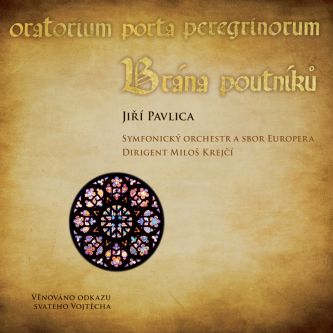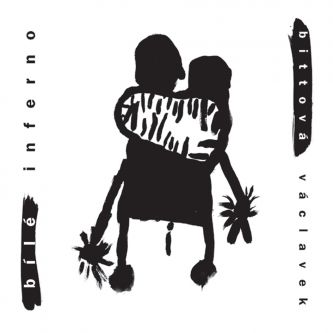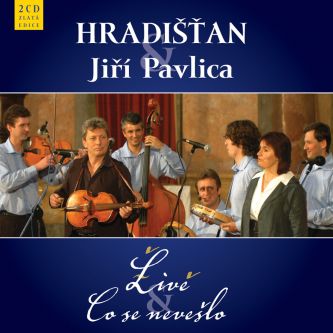
Oratorio inspired by the legacy of Saint Adalbert (Vojtech)
A two disc edition Brana Poutniku (CD and DVD) is a record of a piece by Jiri Pavlica performed as a concert of international project Europera led by conductor Milos Krejci. The oratorio had a premiere in the Saint Vitus' Cathedral in April 2012 and the author dedicated it to the legacy of Saint Vojtech. The interpretation was performed by young and talented musicians from Germany, Poland and the Czech Republic – the orchestra and choir of the project Europera. The orchestra, which comprises of more than 200 musicians was conducted by Milos Krejci and the baritone solo was sung by Roman Janal.
Jiri Pavlica explains why he had been inspired by the legacy left by Saint Adalbert (Vojtech) in European history, a man of great wisdom and a famous philosopher: „I wanted the topic to connect all three nations, which the orchestra Europanea is comprised of – the Germans, the Poles and the Czechs and also that the topic would raise knowledge on history of the three nations. I searched for a historic event or a figure, which would had all that so I discovered Saint Vojtech. On the verge of first and second millennium he was an important person not only for all these nations, but also for the entire Europe.“ Jiri Pavlica invited a Czech-Polish poet Renata Putzlacher to cooperate and she wrote lyrics for nine parts of the oratorio. In the introductory part Jiri Pavlica used a Latin text of the legend of Saint Vojtech by Bruno from Querfurt, which dates back to 11th century.
Saint Adalbert is a saint and a legend that connects many European nations. He is perceived as a protector of Poland, Hungary, Czechia and Slovakia, but also as a European pilgrim, a European. Jiri Pavlica used Saint Vojtech´s legacy in his work as a musical-philosophical narrative, where the dialogs between the past and the present are echoed together with dialogs among various nations and religions. At the same time he confesses: „I´d like the oratorio to become an opportunity for musical dialogs, where the gate of cooperation, mutual understanding and tolerance as well as respecting each other as an individual is wide open.“
There are 10 tracks on the CD and a bonus DVD contains a running commentary by Alfred Strejcek. Recording of the concert which took place under the patronage of cardinal Dominik Duka on 22nd April 2012 in the Saint Vitus' Cathedral in Prague was directed by P. Leos Ryska. The two disc album is wrapped in an exclusive digipack together with a running commentary, Cvs and lyrics in Czech and in English.
St. Adalbert (Vojtěch):
Source: http://en.wikipedia.org/wiki/Adalbert_of_Prague
Adalbert (Vojtěch) was born into a noble Czech family of Prince Slavník and his wife Střezislava in Libice nad Cidlinou, Bohemia. The Chambers Biographical Dictionary mistakenly gives his year of birth as 939.[1] His father was a rich and independent ruler of the Zličan princedom that rivaled Prague (see Slavník's dynasty). Adalbert had five full brothers: Soběslav (Slavnik's heir), Spytimír, Pobraslav, Pořej, Čáslav and a half-brother Radim (Gaudentius) from his father's liaison with another woman. Radim chose a clerical career as did Adalbert, and took the name Gaudentius. Adalbert was a well-educated man, having studied for about ten years (970-80) in Magdeburg under Saint Adalbert of Magdeburg. Upon the death of his mentor, he took the name Adalbert. Gifted and industrious, Adalbert soon became well-known all over Europe.
Religious acts
In 980 Adalbert finished his studies at Magdeburg school and returned to Prague, where he became a priest. In 981 his father, Prince Slavnik, and both his mentors died. In 982, still not yet thirty years old, Adalbert became the Bishop of Prague. Although Adalbert descended from a rich family and could afford comfort and luxury, he lived poorly of his own free will. He was noted for charity, austerity, and zealous service to the Church. His duty was difficult even in baptized Bohemia, as the pagan creed was deeply embedded in the peoples' minds. Adalbert complained of polygamy and idolatry, which still were not unusual among the Czechs. He also strongly resented the participation of baptized Christians in the slave trade.
In 989 he resigned from his bishop's cloth and left Prague. He went to Rome and lived as a hermit in St. Alexis Benedictine monastery. Four years later, in 993, Pope John XV sent him back to Bohemia. Adalbert became the Bishop again. That time he founded a monastery in Břevnov, near Prague, the first one in the Czech lands. Nonetheless, the nobility there continued to oppose his ministry. Also, according to Cosmas' chronicle, high clerical office was a burden to Adalbert, and in 994 he offered it to Strachkvas who was Přemyslid and Duke Boleslav's brother. Strachkvas, nevertheless, refused.
In 995 Slavniks' former rivalry with the Přemyslids (allied with Vršovci) resulted in the storming of Libice led by Boleslaus II the Pious. During the struggle four (or five) of Adalbert's brothers were murdered. Thus the Zličan princedom became part of the Přemyslids' estate. Adalbert didn't like the murderers in church and, according to the legend, predicted that Vršovci would be severely persecuted. After the tragedy he could not stay in Bohemia and escaped from Prague, despite the Pope's call for him to return to his episcopal see. Strachkvas was eventually appointed to be his successor. However, when he was going to assume the Bishop office in Prague, he suddenly died during the ceremony itself. Circumstances of his death are still unclear.
Mission and martyrdom in Prussia
Adalbert of Prague had already in 977 entertained the idea of becoming a missionary in Prussia. After he had converted Hungary, he was sent by the Pope to convert the heathen Prussians. Boleslaus the Brave, duke of Poland (later king), sent soldiers with Adalbert. The bishop and his followers - including his half-brother Radim (Gaudentius) - entered Prussian territory and went along the Baltic Sea coast to Gdańsk.
It was a standard procedure of Christian missionaries to try to chop down sacred oak trees, which they had done in many other places, including Saxony. Because the trees were worshipped and the spirits who were believed to inhabit the trees were feared for their powers, this was done to demonstrate to the non-Christians that no supernatural powers protected the trees from the Christians.
When they did not heed warnings to stay away from the sacred oak groves, Adalbert was martyred in April 997 on the Baltic Sea coast east of Truso (currently Elbląg, Elbing), or near Tenkitten and Fischhausen (see external link map St. Albrecht) It is recorded that his body was bought back for its weight in gold by Boleslaus the Brave.

| CD | $ 12.03 |
| MC | $ 3.53 |
| MP3 | $ 6.66 |
| LP | $ 34.15 |
| FLAC+mp3 | $ 8.89 |
| WAV+mp3 | $ 11.13 |

| CD | $ 15.16 |
| MP3 | $ 6.66 |
| FLAC+mp3 | $ 8.89 |

| CD | $ 10.69 |
| MP3 | $ 4.42 |
| FLAC+mp3 | $ 6.66 |